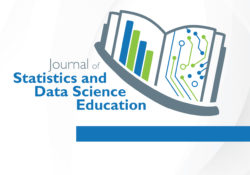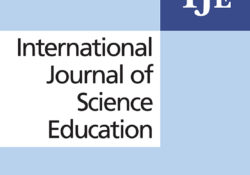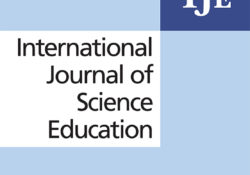tandfonline.com har udgivet en rapport under søgningen „Teacher Education Mathematics‟: ABSTRACT ABSTRACT Background: Creativity is an important skill for the future society and developing students’ creativity is an important part of science education. Working on a creative science project may help developing students’ creative abilities, and the interaction between teacher and students during the work on defining a problem and solving the problem, is an ideal forum for supporting students’ creativity. Purpose: The purpose of the study is to get insight into how teachers respond to students’ creative ideas during the works on a creative science project, and how the interaction between teacher and students may support or inhibit students’ creative abilities. Design and methods: Data in this study consist of 49 video-recorded interactions between two teachers and student groups… Continue Reading →
Like this:
Like Loading...
tandfonline.com har udgivet en rapport under søgningen „Teacher Education Mathematics‟: ABSTRACT ABSTRACT The Cognitive Acceleration (or Let’s Think) approach to mathematics teaching is a Piagetian programme drawing on Vygotsky’s research, developed at King’s College London over 30 years ago, along with its associated professional development (PD) programme. This project sought to replicate the original studies conducted 10–15 years earlier and before much national curriculum change, through a professional development project with 41 teachers of children aged 6–12 from London in 2014. Results of pre- and post-test of mathematics attainment are reported for 232 students. Despite a shorter duration, data shows increased teacher efficacy, improved teaching and a mean gain equivalent to 2.6 months learning for benefitting students, which broadly mirrors cognitive effects of original trials with twice the duration. This… Continue Reading →
Like this:
Like Loading...
tandfonline.com har udgivet en rapport under søgningen „Teacher Education Mathematics‟: ABSTRACT ABSTRACT Context-based learning aims to make learning more meaningful by raising meaningful problems. However, these types of problems often require reflection and thinking processes that are more complex and thus more difficult for students, putting high demands on students’ problem-solving capabilities. In this paper, students’ approaches when solving context-based chemistry problems and effects of systematic scaffolds are analysed based on the Model of Hierarchical Complexity. Most answers were initially assigned to the lowest level of the model; higher levels were reached without scaffolds only by few students and by most students with scaffolds. The results are discussed with regard to practical implications in terms of how teachers could make use of context-based tasks and aligned scaffolds to help students… Continue Reading →
Like this:
Like Loading...
tandfonline.com har udgivet en rapport under søgningen „Teacher Education Mathematics‟: ABSTRACT ABSTRACT In this study, we explore the issues and challenges involved in supporting students’ learning to discern relevant and critical aspects of determining oxidation states of atoms in complex molecules. We present a detailed case of an interaction between three students and a tutor during a problem-solving class, using the analytical tool of practical epistemology analysis (PEA). The results show that the ability to make relevant distinctions between the different parts of a molecule for solving the problem, even with the guidance of the tutor, seemed to be challenging for students. These shifts were connected to both purposes that were specific for solving the problem at hand, and additional purposes for general learning of the subject matter, in this… Continue Reading →
Like this:
Like Loading...

tandfonline.com har udgivet en rapport under søgningen „Teacher Education Mathematics‟: ABSTRACT ABSTRACT The CASE project (Case-based Approaches to Statistics Education; see www.mas.ncl.ac.uk/∼nlf8/innovation) was established to investigate how the use of real-life, discipline-specific case study material in Statistics service courses could improve student engagement, motivation, and confidence. Ultimately, the project aims to promote deep learning of course material, with students from other disciplines being equipped with the skills to undertake independent quantitative analyses (for example, in their final year dissertations). In this article, I describe the case-based materials and associated activities, developed as part of this project, for first year Business undergraduates taking a compulsory course in quantitative methods. I also attempt to evaluate the success of the CASE project through a trial in which a randomly selected subgroup of students… Continue Reading →
Like this:
Like Loading...
tandfonline.com har udgivet en rapport under søgningen „Teacher Education Mathematics‟: ABSTRACT ABSTRACT The purpose of this study was to enhance our understanding of the relationship between collaborative talk and metacognitive talk during group mathematical problem-solving. Research suggests that collaborative talk may mediate the use of metacognitive talk, which in turn is associated with improved learning outcomes. However, our understanding of the role of group work on the individual use of metacognition during problem-solving has been limited because research has focused on either the individual or the group as a collective. Here, primary students (aged nine to 10) were video-recorded in a naturalistic classroom setting during group mathematical problem-solving sessions. Student talk was coded for metacognitive, cognitive and social content, and also for collaborative content. Compared with cognitive talk, we found… Continue Reading →
Like this:
Like Loading...
tandfonline.com har udgivet en rapport under søgningen „Teacher Education Mathematics‟: Abstract As the demand for skilled data scientists has grown, university level statistics and data science courses have become more rigorous in training students to understand and utilize the tools that their future careers will likely require. However, the mechanisms to assess students’ use of these tools while they are learning to use them are not well defined. As such, a framework to assess statistical computing actions was created. Using task-based interviews of students who completed a second course in statistics, the framework was used to determine the ways in which students utilize statistical computing tools, specifically R, while going through problem solving phases. Patterns that emerged are discussed. Link til kilde
Like this:
Like Loading...






